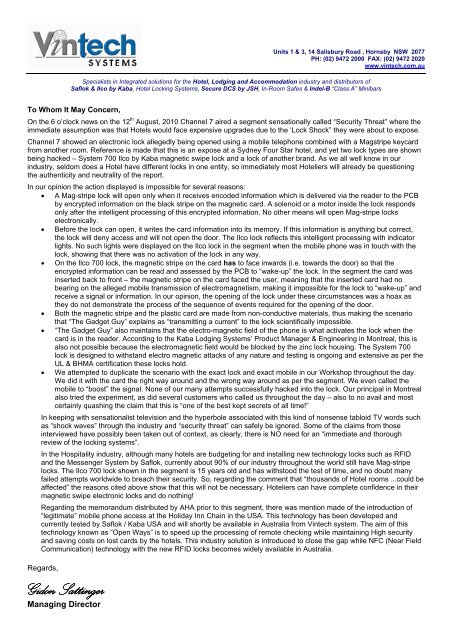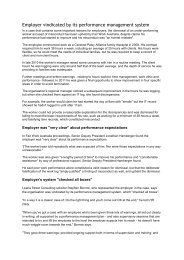Gidon Sattinger - Australian Hotels Association
Gidon Sattinger - Australian Hotels Association
Gidon Sattinger - Australian Hotels Association
Create successful ePaper yourself
Turn your PDF publications into a flip-book with our unique Google optimized e-Paper software.
Units 1 & 3, 14 Salisbury Road , Hornsby NSW 2077<br />
PH: (02) 9472 2000 FAX: (02) 9472 2020<br />
www.vintech.com.au<br />
Specialists in Integrated solutions for the Hotel, Lodging and Accommodation industry and distributors of<br />
Saflok & Ilco by Kaba, Hotel Locking Systems, Secure DCS by JSH, In-Room Safes & Indel-B “Class A” Minibars<br />
To Whom It May Concern,<br />
On the 6 o’clock news on the 12 th August, 2010 Channel 7 aired a segment sensationally called “Security Threat” where the<br />
immediate assumption was that <strong>Hotels</strong> would face expensive upgrades due to the ‘Lock Shock” they were about to expose.<br />
Channel 7 showed an electronic lock allegedly being opened using a mobile telephone combined with a Magstripe keycard<br />
from another room. Reference is made that this is an expose at a Sydney Four Star hotel, and yet two lock types are shown<br />
being hacked – System 700 Ilco by Kaba magnetic swipe lock and a lock of another brand. As we all well know in our<br />
industry, seldom does a Hotel have different locks in one entity, so immediately most Hoteliers will already be questioning<br />
the authenticity and neutrality of the report.<br />
In our opinion the action displayed is impossible for several reasons:<br />
• A Mag-stripe lock will open only when it receives encoded information which is delivered via the reader to the PCB<br />
by encrypted information on the black stripe on the magnetic card. A solenoid or a motor inside the lock responds<br />
only after the intelligent processing of this encrypted information. No other means will open Mag-stripe locks<br />
electronically.<br />
• Before the lock can open, it writes the card information into its memory. If this information is anything but correct,<br />
the lock will deny access and will not open the door. The Ilco lock reflects this intelligent processing with indicator<br />
lights. No such lights were displayed on the Ilco lock in the segment when the mobile phone was in touch with the<br />
lock, showing that there was no activation of the lock in any way.<br />
• On the Ilco 700 lock, the magnetic stripe on the card has to face inwards (i.e. towards the door) so that the<br />
encrypted information can be read and assessed by the PCB to “wake-up” the lock. In the segment the card was<br />
inserted back to front – the magnetic stripe on the card faced the user, meaning that the inserted card had no<br />
bearing on the alleged mobile transmission of electromagnetism, making it impossible for the lock to “wake-up” and<br />
receive a signal or information. In our opinion, the opening of the lock under these circumstances was a hoax as<br />
they do not demonstrate the process of the sequence of events required for the opening of the door.<br />
• Both the magnetic stripe and the plastic card are made from non-conductive materials, thus making the scenario<br />
that “The Gadget Guy” explains as “transmitting a current” to the lock scientifically impossible.<br />
• “The Gadget Guy” also maintains that the electro-magnetic field of the phone is what activates the lock when the<br />
card is in the reader. According to the Kaba Lodging Systems’ Product Manager & Engineering in Montreal, this is<br />
also not possible because the electromagnetic field would be blocked by the zinc lock housing. The System 700<br />
lock is designed to withstand electro magnetic attacks of any nature and testing is ongoing and extensive as per the<br />
UL & BHMA certification these locks hold.<br />
• We attempted to duplicate the scenario with the exact lock and exact mobile in our Workshop throughout the day.<br />
We did it with the card the right way around and the wrong way around as per the segment. We even called the<br />
mobile to “boost” the signal. None of our many attempts successfully hacked into the lock. Our principal in Montreal<br />
also tried the experiment, as did several customers who called us throughout the day – also to no avail and most<br />
certainly quashing the claim that this is “one of the best kept secrets of all time!”<br />
In keeping with sensationalist television and the hyperbole associated with this kind of nonsense tabloid TV words such<br />
as “shock waves” through the industry and “security threat” can safely be ignored. Some of the claims from those<br />
interviewed have possibly been taken out of context, as clearly, there is NO need for an “immediate and thorough<br />
review of the locking systems”.<br />
In the Hospitality industry, although many hotels are budgeting for and installing new technology locks such as RFID<br />
and the Messenger System by Saflok, currently about 90% of our industry throughout the world still have Mag-stripe<br />
locks. The Ilco 700 lock shown in the segment is 15 years old and has withstood the test of time, and no doubt many<br />
failed attempts worldwide to breach their security. So, regarding the comment that “thousands of Hotel rooms ...could be<br />
affected” the reasons cited above show that this will not be necessary. Hoteliers can have complete confidence in their<br />
magnetic swipe electronic locks and do nothing!<br />
Regarding the memorandum distributed by AHA prior to this segment, there was mention made of the introduction of<br />
“legitimate” mobile phone access at the Holiday Inn Chain in the USA. This technology has been developed and<br />
currently tested by Saflok / Kaba USA and will shortly be available in Australia from Vintech system. The aim of this<br />
technology known as “Open Ways” is to speed up the processing of remote checking while maintaining High security<br />
and saving costs on lost cards by the hotels. This industry solution is introduced to close the gap while NFC (Near Field<br />
Communication) technology with the new RFID locks becomes widely available in Australia.<br />
Regards,<br />
<strong>Gidon</strong> <strong>Sattinger</strong><br />
Managing Director
Aug 24, 2010<br />
To: All of our customers<br />
Subject: Locks override in Channel 7 Australia program<br />
Dear Sir/Madam:<br />
We can assure you that the locks shown in the television report are not<br />
VingCard or TimeLox locks.<br />
We have tested all of our locks to make sure that they cannot be compromised using<br />
the methods shown in the report.<br />
Please contact us if you would like more information.<br />
Arnon Alexander<br />
Executive Vice President<br />
R&D<br />
ASSA ABLOY Hospitality Inc.<br />
(404) 219-2800<br />
aalexander@aahgroup.com<br />
An ASSA ABLOY company 631 International Pkwy Suit 100 Richardson TX 75081



